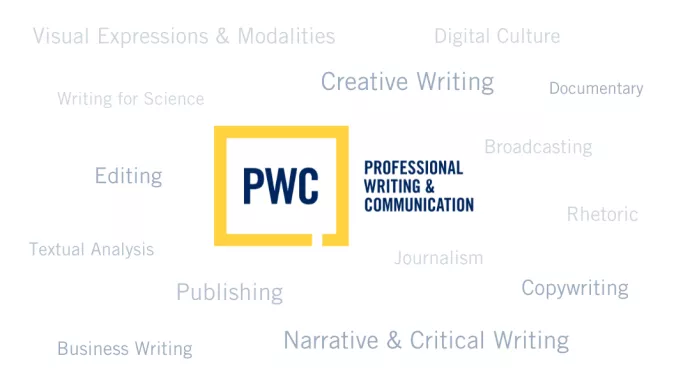
Professional Writing and Communication (PWC) is an interdisciplinary undergraduate program that combines the scholarly rigour of the liberal arts with hands-on professional industry training. PWC provides students with a theoretical foundation in narrative and rhetoric and practical expertise in a range of written and visual expressions and modalities. PWC treats communication as interdisciplinary and socially situated.
Contents
- Objectives
- Course sneak peek
- Skills developed in PWC
- Prospective careers
- Program plan
- Admissions
- Contact
Objectives
The PWC curriculum grows out of research grounded in anthropology, philosophy, psychology, sociology, linguistics and literature. Students examine the way written and oral communication works in professional, academic, artistic, personal and public settings.
The program's curriculum emphasizes the multicultural, multi-modal and team-oriented character of a professional writing practice that corresponds to technological and cultural shifts of our contemporary world. Seminars and workshop-style classes give PWC students experience with cross-cultural communications and research-based writing in six different streams:
- Science & Communication
- Technical & Digital Writing & Editing
- Creative Non-Fiction
- Financial Writing
- Narrative & Critical Writing
- Professional Practice
PWC students learn to:
- Identify the subtle distinctions and complex variations that affect communication including the language and grammatical structures that affect meaning
- Select and creatively use appropriate new media technologies/modalities for communicating
- Recognize the positionality and importance of their own written voice
- Identify effective narrative and/or rhetorical strategies for specific communities and contexts
- Apply core principles and theories of narrative and rhetoric to communication practices, including writing and presentations
- Produce high-production value narrative documentary media stories
- Analyze and critique stories and arguments that deny or disguise subjectivity
- Review, evaluate, and select authoritative and credible information sources
- Apply knowledge of language and dynamic prose to solve communication problems and effectively engage the reader(s)/listener(s)
- Critically read, edit, and assess professional writing and editing practices across a range of discourses and diverse fields
- Promote and maintain ethical practices and integrity in all forms of communication
- Identify career paths and/or further studies within professional writing and communications
Program of Study (POSt)
- Major Program ERMAJ1302 Professional Writing and Communication (Arts)
- Minor Program ERMIN1302 Professional Writing and Communication (Arts)
Course sneak peek
Discover the building blocks of an editor’s skills in WRI365Y5 Editing: Principles and Practice. You will learn the principles of editing and the editorial process as it applies to many forms of media.
Take WRI420H5 Making a Book to learn about the process of publishing your own book. You will learn the principles, procedures and practices in book publishing and by the end of the course, you will be a published author!
PWC faculty members help students organize and participate in publishing and reading events within the university, including Mindwaves, the official journal of the PWC program; book launches for PWC course collections or student publications; and evening readings of student work. Faculty also help students get involved in the writing, publishing, journalism and broadcast world.
View the Academic Calendar for a full listing of ICCIT courses and their descriptions.
Skills developed in PWC
- Communication: communicate clearly and effectively for a broad range of purposes and audiences including technical copy, business writing, marketing copy, speeches, proposals and presentations, as well as present persuasive arguments.
- Technical: textual analysis and interpretation, as well as editing.
- Research: gather and evaluate information, sources, ideas and research; conduct intense primary and secondary research; and conduct and clearly explain research results.
- Organization & time management: organize ideas, information, materials, and people, learn to become deadline oriented.
Prospective careers
The career you choose will depend on your experience and interests. Visit the Career Centre to explore your career options.
- Careers for graduates: Communications specialist; Technical writer; Editorial assistant; Science writer; Script writer; Sports editor; Promotion specialist; Media relations officer; Technical writer; Speech writer; Author; Social media community manager; Medical writer; Creative writer, Public relations; Web copy analyst; Advertising, Government; Not-for-profit sector, Journalist; Copywriter.
- Workplaces: Entertainment; Computer and IT; Communications; Medical/Healthcare; Research; Travel; Environment; Customer experience; Biotechnology; Advertising; Policy.
Program plan
Make the most of your time at UTM and the many opportunities available for PWC students by exploring the PWC Program Plan.
The Program Plan was developed in collaboration with the Career Centre and ICCIT.
Admisisons
- Admission to the University of Toronto Mississauga (UTM)
- All program areas require an Ontario Secondary School Diploma, or equivalent, with six Grade 12 U/M courses, or equivalent, including English. The admission average is calculated with English plus the next best five courses. The approximate average required for admission is mid- to high-70s.
- Visit the PWC Admissions page to learn more about studying at UTM, the admission process and requirements.
- Current UTM students
- All ICCIT programs (CCIT, DEM, PWC and TCS) are considered “Type 3” and limited enrolment.
- When choosing a program of study (subject POSt), all students, including transfer students, must meet the PWC Major or Minor program-entry requirements as outlined in the Academic Calendar.
- For more information on choosing programs, how to apply for subject POSt and timelines, visit the Office of the Registrar’s Program Selection webpage.
Contact
- Connect with Truc Tran (she/her), ICCIT Undergraduate Program Coordinator via email at iccit.advising@utoronto.ca
